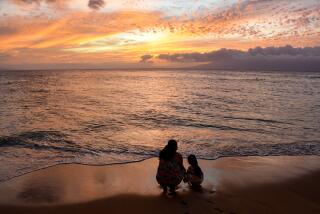Sanitation Concerns Loom Over Kauai : Disaster: Officials take steps to prevent spread of food poisoning. Senate approves $3 billion in aid for victims of Hurricane Iniki in Hawaii and Andrew in Florida.
HONOLULU — Mail carriers began making their rounds Tuesday on hurricane-ravaged Kauai, giving residents a first, welcome sign of normal life, but poor sanitation loomed as a major health threat.
“Food rots. We are certainly concerned about food poisoning,” said Roy Price, vice director of the state civil defense agency. He urged people to bury spoiled food to prevent the spread of disease on the island’s fifth day without electricity. “If you set it out some place, someone else might come along and pick it up or your pets might eat it.”
In Washington, the Senate voted to provide $3 billion to help Hawaii rebuild from Hurricane Iniki and to satisfy growing pleas for help from the victims of Hurricane Andrew in Florida.
Hurricane Iniki, which swept across Kauai with devastating results last Friday afternoon, knocked down virtually all of the island’s utility poles. The jumbled mess on the roads claimed a life Monday night when a Hawaii Air National Guard member died after being pinned under a truck that flipped when it became entangled in wires. Technical Sgt. Dennis C. Dalen, 46, was the storm’s seventh fatality.
Roughly 5,000 poles around the island need to be replaced, according to Maj. Gen. Edward Richardson, the state civil defense director. “It’s an enormous task to restore power,” he said. “It’s going to take a while.” Diesel generators kept waste water treatment plants functioning, at least for the moment.
Banks and electronic cash machines reopened on the island Tuesday, allowing some residents to cash the paychecks carried in the first mail service since the storm. Officials hoped to open several elementary schools on Friday.
“We think it’s important that the schools are re-established and Kauai schoolchildren can get back their normal lives,” Richardson said.
Restoration of telephone service was set back late Monday when a construction crew clearing debris from the roadway severed a trunk cable between Lihue and Kapaa. Calls to and from the island are possible only from the Lihue area, said Hawaiian Telephone spokesman Mark Doyle.
He said the company shipped 170 pay telephones to Lihue so that people in other areas can go there to place calls.
Disaster experts praised the way Kauai residents have responded to the challenge of Hurricane Iniki by beginning to rebuild immediately, but warned that an emotional letdown may soon take over as the enormity of the situation sinks in.
“Right now there is an eagerness and a high level of energy, but eventually, the reality will set in,” said Kim Whitman, a regional director for the Federal Emergency Management Agency, who came to Hawaii on his way back from dealing with the aftermath of Typhoon Omar on Guam.
Although there were scattered incidents of price gouging on Kauai, Price said there were no reports of looting.
“Twelve hours after the hurricane, there were people on their roofs, working, and there were people out in the surf swimming,” Whitman said. “I could see that this wasn’t going to be a case of people waiting around so they can loot each other’s house. These are people helping each other.”
The Pacific Missile Range at Barking Sands, on the south side of the island, has become a major staging area for relief supplies. A Navy ship ferried five-ton trucks, Humvees, field kitchens, and portable showers there Tuesday. Officials reported there was ample emergency food available, including 70,000 “meals-ready-to-eat.”
With Saturday’s primary election approaching, the lieutenant governor’s office made arrangements with the National Guard to help staff polling places. National Guard troops also planned to distribute flyers to educate the public on the dangers of food contamination.
In Washington, senators on a voice vote tacked the new hurricane aid onto a measure that initially contained $7.5 billion in loans and grants for residents of Florida and Louisiana battered last month by Hurricane Andrew.
“Kauai is a scene of unimaginable devastation,” said Sen. Daniel Akaka (D-Hawaii), who made a weekend trip to the island. “Whenever you see a coconut tree and its leaves stripped, you know that its winds were strong.”
The bill’s chief sponsor, Appropriations Committee Chairman Robert Byrd (D-W.Va.), said he hoped that final legislation could be sent to President Bush by the end of the week. But the bill’s immediate future was clouded because it included two unrelated provisions--dealing with abortion and labor regulations--that drew veto threats from Administration officials.
The $10.5-billion measure would be easily the biggest federal relief package ever for a natural disaster, dwarfing the $2.9 billion approved in 1990 for California’s Loma Prieta earthquake. It would also further swell the federal deficit.
The original $7.5-billion hurricane bill, completed last Thursday, was rendered moot a day later when Iniki slammed Hawaii with 160-m.p.h. winds and 30-foot waves. In addition to the dead and about 330 injured, Iniki left 8,000 homeless and caused an estimated $1 billion in damage.
The bill would also provide money for Guam, lashed by Typhoon Omar on Aug. 28. That storm caused $250 million in damage.
The Associated Press contributed to this report.
More to Read
Sign up for Essential California
The most important California stories and recommendations in your inbox every morning.
You may occasionally receive promotional content from the Los Angeles Times.









